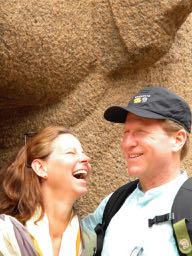What is a mature friendship?
I love the fact that we can consider being in relationship with others in a way that lets them be fully who they are, knowing that they are also letting us be fully who we are.
This doesn’t always happen.
In fact, you could even say it’s unusual. Very often in social groups there’s kind of an expected norm of how we should think and feel.
We come together as groups of people based on similarities, similar world views, similar values and aspirations. But there are nuances. Inevitably there are nuances. In some friendships, families and social circles, people often hold back from expressing their unique perspective on a given subject. They hold back because they want to be accepted. And there’s perhaps an unspoken rule that if we disagree with the values and feelings of the family or group, even in a small way, then we’ve become a little bit of an outsider in the group or in the friendship.
Sometimes with close friends it can be even more complicated. We want our best friends to feel the same way that we do about important matters. The closer these matters are to our heart and to our sense of identity, the more important it can be for us. We feel we want our friends to agree with us. We don’t want to hear a different perspective. It’s almost a knee-jerk reaction for most of us.
So where does this come from?
Are we at fault because of this? Not necessarily. As a society, over the centuries, we’ve developed through various phases of safety. Certainly within a tribe it was important for all members to behave in a similar fashion, to have consistent values, to face the world that was outside and unsafe, with a united front. So it is natural that our reflexive thoughts and habits, that have evolved over the centuries, consider difference of opinion as a threat. Alternative perspectives and different habits tend to register as unsafe in a pre-verbal part of our brain. This is so routine as a result of centuries of slow evolution, that part of our chemical structure registers this difference of opinion and perspective as unsafe. This is wholly unconscious on our part. When someone disagrees with our perspective we feel them as ‘other’. We may feel we need to convince them. Or we may feel that in some small way they have betrayed us.
In the western world we live in relatively safe times. We also live in communities of many belief systems, all united within our western countries. We live with multiple religious and philosophical beliefs, multiple political beliefs, multiple views of what success and happiness looks like in the world.
We are profoundly fortunate to live in community where this is true. This is not true for most of the planet. So we are at the cutting edge of changing relationships and that requires us to step back and look at our assumptions. In this case the reflex assumption is that a different perspective is in someway ‘at root’ a betrayal. Or perhaps a different viewpoint is just that, a slightly different perspective.
Perhaps we can see our own perspective in new ways by ‘in a small way’ considering alternative views. It often takes a lot for us as humans to question our reflexive beliefs. Sometimes it happens with tragedy. Sometimes it happens when we lose an important relationship. Sometimes it happens through the suffering of disagreements within our family. Sometimes it happens because we consciously make a choice to say, ‘I may not be right about everything’. I’m curious. I’m curious about the other ways of understanding the world.
So what does it mean to be in a rich, mature friendship?
What does it mean to have a mature relationship with our partner, our adult children and with our parents? What does it mean to harmoniously live in community? A great place to start is to recognize and celebrate difference. Be curious about the difference. Invite the expression of difference by asking questions.
I can be in a relationship with you, I can love you and we can feel totally different about one of our core beliefs. We can still respect each other. We can still care for each other. We can still know that essentially we are good people. And we can accept the fact that we ‘don’t have to be right!’ We can accept ambiguity regarding the absolute solution to a particular issue, problem, or consideration in the world.
The scientific world is a great model. We see how what was believed in the 12th century is overturned in the 15th century, what is believed in the 15th century is overturned in the 19th and 20th century. We see this overturning and new understanding.
So why should we believe that any of our current thoughts on a given situation are absolutely perfect? Why should we think that we personally have to be right?
Can we create a little more space inside of ourselves and in our relationships so that we celebrate, or at least except difference? I love the ability to be curious about another’s perspective. Inevitably when I probe through thoughtful questions, my own perspective broadens or alters. My perspective may not change entirely, but inevitably it broadens. I love the idea of being able to be in mature adult relationships; where others let me be as I am, knowing that essentially I am good, as I know that they essentially are good. The difference does not divide us, but rather is a place of comfortable expansion.
Let this mature relationship not sublimate or hide disagreement.
Let the mature relationship allow different belief or understanding to simply rest open. Whenever we tuck something away in a psychological or emotional corner, there are ways in which it haunts us. When we let difference have fresh air, we can coexist with the parts of the person, or community, we care about and value. The difference does not act as a poison seed.
Rather than hiding the difference, name the difference. Naming opens space and takes away some of the reflexive primal need to change another. When we ‘name’, when we describe the difference, this moment brings a choice forward. In this moment we can expand rather than contract. We can accept our differences. We evolve our minds. We can help ourselves and our relationships as we commit to expressing sincerely, without fear of repercussions and without expectations of compliance. Besides, it is the tension of difference that brings about most growth. What will you discover while making a habit of celebrating difference?
Harvest
As we go into this time of harvest and sharing the bounty, let’s let one of the bounties we share be the ability to stand in mature relationships. Let us be able to allow others to have different perspectives without feeling the need to change them or change ourselves. When we see that another feels the need to change us, let us have the words to open this up, in a gentle and easy way, so they know we do not think they are ‘less than’ or are ‘wrong’ because they do not see things exactly as we see them.
Friendships and family bonds nurture us deeply and are a source of growth. Inevitably relationships expand us. By choosing to embrace difference, we expand the love in our lives.


